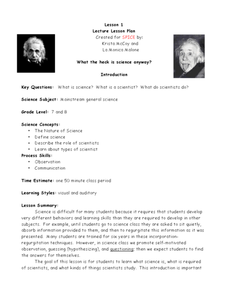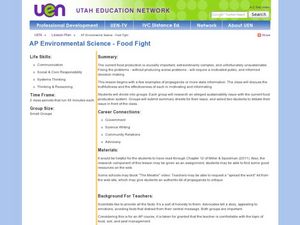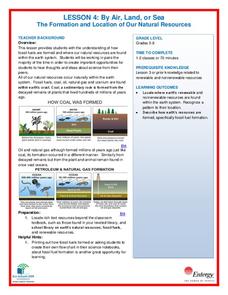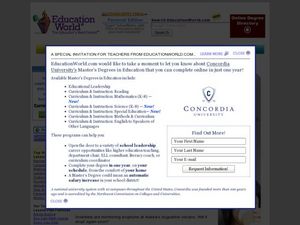Curated OER
Space and Science Fiction
Use the Franklin Institute's exhibition "An Inquirer's Guide to the Universe" to have students research ideas for a science fiction story. After completing their research, writers will compose science fiction stories that incorporate...
Curated OER
Designing and Creating Earth Science Lessons with Google Earth
Everything from adding an overlay to uploading images to navigating the software, teachers become apt at using Google Earth™ in the classroom to create Earth Science lessons.
Curated OER
Polar Scientists: Polar Science
Research skills are extremely important and they can be linked to any subject. Get your class thinking about scientists that study the polar region, what they do, and how they get funded to continue their research. Each child uses a...
Curated OER
Apples: Family and Consumer Science
Learning to cook and making good food choices are extremely important life skills. Seventh graders explore food science in relation to health and nutrition, by conducting several experiments on apples. Websites, movies, and instructional...
Curated OER
What the Heck Is Science Anyway?
Here is a 12-page outline of an introductory science lesson. The teacher lectures on what science is, the role of a scientists, different disciplines of science, and the impact of scientific discoveries. Detailed lecture notes are...
Curated OER
Space Science: Adventure is Waiting
These full-color handouts feature two activities. The first is a reading on comets, meteors, and meteoroids. Your space science learners will examine ten phrases and determine which of the three each characterizes. The second activity...
California Academy of Science
Human Evolution
As the great and hilarious Tim Minchin once said, "Science is simply the word we use to describe a method of organizing our curiosity." Science is more than just a guess; it is based on questions, observations, and evidence. High...
Curated OER
AP Environmental Science-Food Fight
The content in this lesson is of a controversial nature. Please review to make sure it is suitable for your class. A video, The Meatrix is shown to the class, and then they discuss the emotionally-charged language that it uses. They are...
Curated OER
Science and Art Museum
Imagine each one of your learners on task and interested in scientific material. Learners investigate science related art by creating a small museum! Using digital cameras, pupils photograph different scientific actions that look...
Children’s Hospital of Philadelphia
Vaccine Safety
Enter the debate on vaccines. Small groups research topics related to vaccine safety in the last lesson in a unit of five. In the process of the research, team members learn how to determine the validity and credibility of a website. The...
Discovery Education
Sonar & Echolocation
A well-designed, comprehensive, and attractive slide show supports direct instruction on how sonar and echolocation work. Contained within the slides are links to interactive websites and instructions for using apps on a mobile device to...
McAuliffe-Shepard Discovery Center
Global Warming in a Jar
This well-organized lab activity introduces earth science pupils to the greenhouse effect. They will set up two experiments to monitor temperatures in an open jar, a closed jar, and a closed jar containing water. Ideally, you would have...
Curated OER
What is an Ecological Footprint?
Introduce youngsters to the term ecological footprint. Learners identify ways in which humans affect the environment. They look at the problems associated with the use of natural resources, and focus on ways to preserve natural...
National Wildlife Federation
By Air, Land, or Sea: The Formation and Location of Our Natural Resources
Coal forms from the ancient remains of plants that were alive on Earth before the dinosaurs! Scholars use their t-charts from the previous lesson over resources and research to determine if their information is correct. Through analysis...
Baylor College
HIV/AIDS in the United States
In the final of five lessons about HIV/AIDS, groups create presentations to share data about the infection rates in the United States, examining demographic and geographic trends over the past ten years. Depending on how much time you...
NOAA
Ground-truthing Satellite Imagery with Drifting Buoy Data
Ground-truthing ... is it even a word? The last installment of a five-part series analyzes how scientists collect sea surface temperature data. Scholars use government websites to compare temperature data collected directly from buoys...
Chicago Botanic Garden
Personal Choices and the Planet
The last activity in the series of four has individuals determine steps they can take to reduce their carbon footprints and then analyze their schools' recycling programs. Through a sustainability audit, they identify how and where their...
AAAS
Identification and Classification of Grassland Plants
Take learning outside and start classifying grasslands. Young ecologists observe grassland plants in order to classify them into the appropriate species by family. They note their characteristics and where they grow. A true field...
NOAA
Ocean Exploration
Where am I? The second installment of a 23-part NOAA Enrichment in Marine sciences and Oceanography (NEMO) program starts with pupils guessing the years in which major ocean exploration events took place. The lesson then focuses on how...
NOAA
Where Have All the Glaciers Gone?
What happens when ice melts? Well ... water happens. When that melting ice is a glacier, the amount of water that results produces change throughout the world. Middle school science sleuths uncover the truth about global warming, the...
NASA
Radiation Shielding on Spacecraft
Here is a terrific science instructional activity for your elementary schoolers. In it, learners analyze different materials to simulate space radiation shielding on spacecraft, then select the best material to use to build one. This is...
Curated OER
Graphic Organizers for Good Science Reading and Writing
Learners use reading and writing strategies to explain informational text in science. They create and use different types of graphic organizers to understand, interpret, and analyze informational text.
Curated OER
Scientists Use Web Site to Report Volcano Activity
Students react to statements about volcanoes, then read a news article about scientists monitoring eruptions at Augustine volcano in Alaska. In this earth science and current events instructional activity, the teacher introduces the...
Curated OER
Acceleration Science
In collaborative groups, physics learners design and create a web portfolio of internet resoucres explaining poitive and negative acceleration, zero acceleration, and positive and negative velocity. This is a terrific assignment for...

























